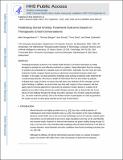| dc.contributor.author | Hoogendoorn, Mark | |
| dc.contributor.author | Berger, Thomas | |
| dc.contributor.author | Schulz, Ava | |
| dc.contributor.author | Stolz, Timo | |
| dc.contributor.author | Szolovits, Peter | |
| dc.date.accessioned | 2020-03-24T21:12:37Z | |
| dc.date.available | 2020-03-24T21:12:37Z | |
| dc.date.issued | 2017-09 | |
| dc.date.submitted | 2016-08 | |
| dc.identifier.issn | 2168-2194 | |
| dc.identifier.issn | 2168-2208 | |
| dc.identifier.uri | https://hdl.handle.net/1721.1/124298 | |
| dc.description.abstract | Predicting therapeutic outcome in the mental health domain is of utmost importance to enable therapists to provide the most effective treatment to a patient. Using information from the writings of a patient can potentially be a valuable source of information, especially now that more and more treatments involve computer-based exercises or electronic conversations between patient and therapist. In this paper, we study predictive modeling using writings of patients under treatment for a social anxiety disorder. We extract a wealth of information from the text written by patients including their usage of words, the topics they talk about, the sentiment of the messages, and the style of writing. In addition, we study trends over time with respect to those measures. We then apply machine learning algorithms to generate the predictive models. Based on a dataset of 69 patients, we are able to show that we can predict therapy outcome with an area under the curve of 0.83 halfway through the therapy and with a precision of 0.78 when using the full data (i.e., the entire treatment period). Due to the limited number of participants, it is hard to generalize the results, but they do show great potential in this type of information. | en_US |
| dc.description.sponsorship | NIH (Grant R01-EB017205) | en_US |
| dc.description.sponsorship | NIH (Grant U54-HG007963) | en_US |
| dc.language.iso | en | |
| dc.publisher | Institute of Electrical and Electronics Engineers (IEEE) | en_US |
| dc.relation.isversionof | http://dx.doi.org/10.1109/jbhi.2016.2601123 | en_US |
| dc.rights | Creative Commons Attribution-Noncommercial-Share Alike | en_US |
| dc.rights.uri | http://creativecommons.org/licenses/by-nc-sa/4.0/ | en_US |
| dc.source | PMC | en_US |
| dc.title | Predicting Social Anxiety Treatment Outcome Based on Therapeutic Email Conversations | en_US |
| dc.type | Article | en_US |
| dc.identifier.citation | Hoogendoorn, Mark et al. "Predicting Social Anxiety Treatment Outcome Based on Therapeutic Email Conversations." IEEE Journal of Biomedical and Health Informatics 21, 5 (September 2017): 1449 - 1459 © 2013 IEEE | en_US |
| dc.contributor.department | Massachusetts Institute of Technology. Laboratory for Computer Science | en_US |
| dc.relation.journal | IEEE Journal of Biomedical and Health Informatics | en_US |
| dc.eprint.version | Author's final manuscript | en_US |
| dc.type.uri | http://purl.org/eprint/type/JournalArticle | en_US |
| eprint.status | http://purl.org/eprint/status/PeerReviewed | en_US |
| dc.date.updated | 2019-07-10T17:34:26Z | |
| dspace.date.submission | 2019-07-10T17:34:27Z | |
| mit.journal.volume | 21 | en_US |
| mit.journal.issue | 5 | en_US |
| mit.metadata.status | Complete | |
